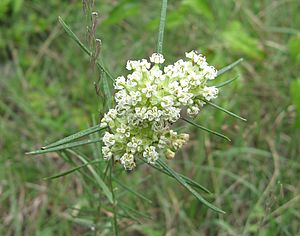Whorled milkweed facts for kids
Quick facts for kids Whorled milkweed |
|
|---|---|
 |
|
| Conservation status | |
| Scientific classification |
|
| Kingdom: | Plantae |
| Clade: | Tracheophytes |
| Clade: | Angiosperms |
| Clade: | Eudicots |
| Clade: | Asterids |
| Order: | Gentianales |
| Family: | Apocynaceae |
| Genus: | Asclepias |
| Species: |
A. verticillata
|
| Binomial name | |
| Asclepias verticillata |
|
| Script error: The function "autoWithCaption" does not exist. | |
Script error: No such module "Check for conflicting parameters".
Asclepias verticillata, also known as Whorled Milkweed or Horsetail Milkweed, is a special plant native to North America. It is a type of milkweed that blooms in the summer. Its flowers are usually white or a pale green color. You can find this plant growing in fields, open woodlands, and prairies. Whorled Milkweed prefers dry soil and sunny or partly shaded spots. It can grow to be about 0.3 to 0.9 meters tall (which is about 1 to 3 feet).
Contents
Discovering Whorled Milkweed
Whorled Milkweed is part of a larger group of plants called milkweeds. These plants are very important for many insects. They are especially vital for Monarch butterflies. Monarch caterpillars eat only milkweed plants. This makes milkweed a key part of their life cycle.
What Makes It Special?
The name "Whorled Milkweed" comes from how its leaves grow. They grow in circles, or "whorls," around the stem. This is a unique feature that helps you identify it. The plant has thin, grass-like leaves.
Where Whorled Milkweed Lives
This plant is found across a large part of North America. It grows well in many different places. You can see it in open areas like meadows and prairies. It also grows on the edges of forests. Whorled Milkweed likes places with dry ground. It does not need a lot of water to grow.
What Whorled Milkweed Looks Like
Whorled Milkweed plants are not very tall. They usually stand between one and three feet high. Their stems are slender and upright. The flowers are small and grow in clusters. These clusters often look like tiny white or light green stars. They bloom during the summer months.
Why Whorled Milkweed Matters
Like other milkweeds, Whorled Milkweed is a very important food plant for insects. It provides nectar for many different pollinators. These include bees, wasps, and other butterflies. Most importantly, it is a host plant for Monarch butterflies. Female Monarchs lay their eggs on milkweed leaves. The caterpillars then hatch and eat the leaves. This helps them grow into butterflies.
People have also used Whorled Milkweed in the past. It was sometimes used as a medicinal plant. Different parts of the plant were used for various purposes. However, it's important to remember that some parts of milkweed plants can be harmful if eaten.
Images for kids
See also
 In Spanish: Asclepias verticillata para niños
In Spanish: Asclepias verticillata para niños
 | DeHart Hubbard |
 | Wilma Rudolph |
 | Jesse Owens |
 | Jackie Joyner-Kersee |
 | Major Taylor |



